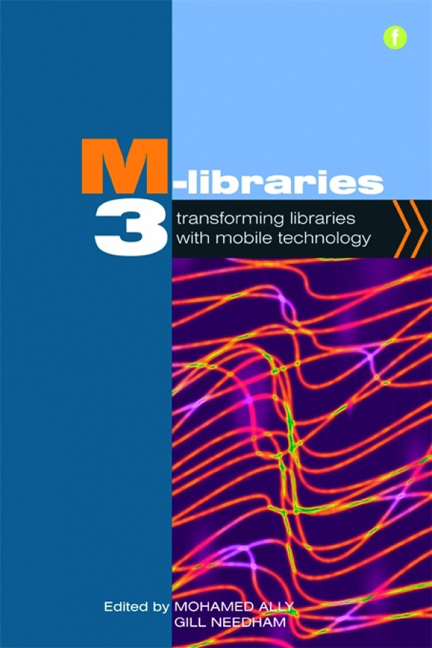Book contents
- Frontmatter
- Contents
- Acknowledgements
- Contributors
- Foreword
- Introduction
- 1 Education for all with mobile technology: the role of libraries
- PART 1 DEVELOPING MOBILE SERVICES
- 2 Preparing for the mobile world: experimenting with changing technologies and applications for library services
- 3 Enhancing open distance learning library services with mobile technologies
- 4 Use of mobile phones in the delivery of consumer health information
- 5 Deploying an e-reader loan service at an online university
- 6 Mobile service providers and library services in a multi-campus library
- 7 Using mobile technology to deliver information in audio format: learning by listening
- 8 Sound selection: podcasts prove positive
- PART 2 PEOPLE AND SKILLS
- PART 3 FOCUS ON TECHNOLOGY
- Conclusion
- Index
5 - Deploying an e-reader loan service at an online university
from PART 1 - DEVELOPING MOBILE SERVICES
Published online by Cambridge University Press: 08 June 2018
- Frontmatter
- Contents
- Acknowledgements
- Contributors
- Foreword
- Introduction
- 1 Education for all with mobile technology: the role of libraries
- PART 1 DEVELOPING MOBILE SERVICES
- 2 Preparing for the mobile world: experimenting with changing technologies and applications for library services
- 3 Enhancing open distance learning library services with mobile technologies
- 4 Use of mobile phones in the delivery of consumer health information
- 5 Deploying an e-reader loan service at an online university
- 6 Mobile service providers and library services in a multi-campus library
- 7 Using mobile technology to deliver information in audio format: learning by listening
- 8 Sound selection: podcasts prove positive
- PART 2 PEOPLE AND SKILLS
- PART 3 FOCUS ON TECHNOLOGY
- Conclusion
- Index
Summary
Introduction
The Universitat Oberta de Catalunya (UOC) is an online university born of the knowledge society and with a mission to provide people with lifelong learning and education. It was founded in 1995. The UOC offers student-centred learning with the benefits of personalized study, flexibility, accessibility and collaboration. In its online study programme, the UOC places the student at the centre of the learning process and provides him/her with the necessary distance learning resources for interaction with the whole of the university community. Learning at the UOC is oriented to responding to the needs of the student and takes into account the demands of the professional environment and technological and social developments.
UOC's educational model
The UOC's educational model is the university's main feature, which has distinguished it since its inception. It was created with the intention of responding appropriately to the educational needs of people committed to lifelong learning, and to make maximum use of the potential offered by the web to perform educational activity.
The learning activity is at the centre of the educational model (Gros, 2009). The students have three main elements with which to carry it out: (1) the resources, which include the content, spaces and tools necessary to performing the learning activities and their assessment; (2) collaboration, a set of communicative and participative dynamics that promote the building of knowledge among classmates and teachers, through teamwork, in order to solve problems and develop projects; and (3) accompaniment, the set of actions performed by teaching staff to monitor and support students.
UOC Library: a virtual library
The UOC Library has offered its services online since its creation in 1995 (March Mir et al., 2010). It has displayed a strong commitment to new technologies throughout this time. It is important to note that the UOC virtual library model implies that traditional library services (loan, reference, document supply, interlibrary loan, information competences, training) are offered at a distance.
The UOC Library also offers remote access from the virtual campus to its electronic resources, without the need for additional configuration on top of the campus access. Since its creation, the UOC Library has provided its services and content description in three languages: Catalan, Spanish and English.
- Type
- Chapter
- Information
- M-Libraries 3Transforming libraries with mobile technology, pp. 43 - 50Publisher: FacetPrint publication year: 2012



